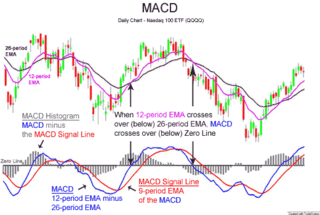Related Research Articles

A leveraged buyout (LBO) is one company's acquisition of another company using a significant amount of borrowed money (leverage) to meet the cost of acquisition. The assets of the company being acquired are often used as collateral for the loans, along with the assets of the acquiring company. The use of debt, which normally has a lower cost of capital than equity, serves to reduce the overall cost of financing the acquisition. The cost of debt is lower because interest payments often reduce corporate income tax liability, whereas dividend payments normally do not. This reduced cost of financing allows greater gains to accrue to the equity, and, as a result, the debt serves as a lever to increase the returns to the equity.
A market trend is a perceived tendency of financial markets to move in a particular direction over time. Analysts classify these trends as secular for long time-frames, primary for medium time-frames, and secondary for short time-frames. Traders attempt to identify market trends using technical analysis, a framework which characterizes market trends as predictable price tendencies within the market when price reaches support and resistance levels, varying over time.

Lehman Brothers Inc. was an American global financial services firm founded in 1847. Before filing for bankruptcy in 2008, Lehman was the fourth-largest investment bank in the United States, with about 25,000 employees worldwide. It was doing business in investment banking, equity, fixed-income and derivatives sales and trading, research, investment management, private equity, and private banking. Lehman was operational for 158 years from its founding in 1850 until 2008.

MACD, short for moving average convergence/divergence, is a trading indicator used in technical analysis of securities prices, created by Gerald Appel in the late 1970s. It is designed to reveal changes in the strength, direction, momentum, and duration of a trend in a stock's price.
Market timing is the strategy of making buying or selling decisions of financial assets by attempting to predict future market price movements. The prediction may be based on an outlook of market or economic conditions resulting from technical or fundamental analysis. This is an investment strategy based on the outlook for an aggregate market rather than for a particular financial asset.
James Steven Chanos is an American investment manager. He is president and founder of Kynikos Associates, a New York City registered investment advisor focused on short selling. A noted art collector, he appeared on the BBC Four documentary The Banker's Guide to Art.

Abby Joseph Cohen is an American economist and financial analyst on Wall Street. As of February 2017, she continues to serve as an advisory director at Goldman Sachs, after retiring from leadership of its Global Markets Institute. Prior to March 2008, she was the firm's Chief Investment Strategist. In 2001 she was named one of the 30 most powerful women in America by Ladies Home Journal. She is also a professor at Columbia Business School.

A covered option is a financial transaction in which the holder of securities sells a type of financial options contract known as a "call" or a "put" against stock that they own or are shorting. The seller of a covered option receives compensation, or "premium", for this transaction, which can limit losses; however, the act of selling a covered option also limits their profit potential to the upside. One covered option is sold for every hundred shares the seller wishes to cover.
Marc Faber is a Swiss investor based in Thailand. He is the publisher of the Gloom Boom & Doom Report newsletter, and the director of Marc Faber Ltd, which acts as an investment advisor and fund manager. Faber also serves as director, advisor, and shareholder of a number of investment funds that focus on emerging and frontier markets, including Asia Frontier Capital Ltd.'s AFC Asia Frontier Fund. Faber is credited for advising his clients to get out of the stock market before the October 1987 crash, and with in 2005-06 writing extensively about an impending crash of home prices, prior to the 2007–2008 financial crisis. In 2017 he was criticized for racist remarks.
Barton Michael Biggs was a money manager whose attention to emerging markets marked him as one of the world's first and foremost global investment strategists, a position he held—after inventing it in 1985—at Morgan Stanley, where he worked as a partner for over 30 years. Following his retirement in 2003, he founded Traxis Partners, a multibillion-dollar hedge fund, based in Greenwich, Connecticut. He is best known for accurately predicting the dot-com bubble in the late 1990s.
Bull–bear line is the index average line that indicates bull market or bear market in stock market.

Meredith Ann Whitney is an American businesswoman hailed as “The Oracle of Wall Street” by Bloomberg. She is known for successfully forecasting the financial crisis of 2007–2008.
L.F. Rothschild was a merchant and investment banking firm based in the United States and founded in 1899. The firm collapsed following the 1987 stock market crash.

Private equity in the 1980s relates to one of the major periods in the history of private equity and venture capital. Within the broader private equity industry, two distinct sub-industries, leveraged buyouts and venture capital experienced growth along parallel although interrelated tracks.

Shearson was the name of a series of investment banking and retail brokerage firms from 1902 until 1994, named for Edward Shearson and the firm he founded, Shearson Hammill & Co. Among Shearson's most notable incarnations were Shearson / American Express, Shearson Lehman / American Express, Shearson Lehman Brothers, Shearson Lehman Hutton and finally Smith Barney Shearson.

Shearson, Hammill & Co. was a Wall Street brokerage and investment banking firm founded in 1902 by Edward Shearson and Caleb Wild Hammill. The firm originally built its business as a stock broker as well as a broker of various commodities, particularly grain and cotton. The firm was a member of the New York Stock Exchange, the Chicago Stock Exchange and the Chicago Mercantile Exchange.
Loeb, Rhoades & Co. was a Wall Street brokerage firm founded in 1931 and acquired in 1979 by Sanford I. Weill's Shearson Hayden Stone. Although the firm would operate as Shearson Loeb Rhoades for two years, the firm would ultimately be acquired in 1981 by American Express to form Shearson/American Express and three years later Shearson Lehman/American Express.
Cogan, Berlind, Weill & Levitt, originally Carter, Berlind, Potoma & Weill, was an American investment banking and brokerage firm founded in 1960 and acquired by American Express in 1981. In its two decades as an independent firm, Cogan, Berlind, Weill & Levitt served as a vehicle for the rollup of more than a dozen brokerage and securities firms led by Sanford I. Weill that culminated in the formation of Shearson Loeb Rhoades.

Thomas A. Russo is an American attorney and former Wall Street executive. He served as vice chairman and chief legal officer of Lehman Brothers Holdings Inc. and as general counsel for American International Group (AIG), two of the companies central to the 2008-2009 global financial crisis.

GMO LLC is an American investment management firm headquartered in Boston. The firm takes a contrarian investing and generally bearish approach to the markets and holds the views that assets will revert to the mean. As a result, the firm has successfully called economic bubbles. At its peak in 2007, the firm had $155 billion in assets under management (AUM) although it has declined since.
References
- 1 2 Norris, Floyd (October 27, 1994). "Garzarelli Is Ousted by Lehman". The New York Times. Retrieved 2010-02-26.
- 1 2 Leak, Bremen (2006-01-03). "She's Bullish. Really Bullish". BusinessWeek. BusinessWeek. Archived from the original on 2006-11-06. Retrieved 2008-03-06.
- ↑ "The Drexel 100 1992–2009". Drexel University Office of Institutional Advancement. 2009. Archived from the original on 2010-05-31. Retrieved 2010-02-26.
- ↑ "The Drexel 100" (PDF). Drexel Blue & Gold. Vol. 17, no. 1. 2006-06-15. pp. 24–25. Archived from the original (PDF) on 2008-04-10. Retrieved 2008-01-12.
- ↑ Hajim, Corey; Yang, Jia Lynn (2007). "Remembering Black Monday - Elaine Garzarelli". Fortune. Retrieved 2008-03-06.
- ↑ "Garzarelli to Liquidate Her 6-Month-Old Fund". Bloomberg News. Bloomberg. 1997-11-06. Retrieved 2008-03-06.
- ↑ "Elaine Garzarelli: It's All in the Timing". BusinessWeek. 2003-03-24. Archived from the original on 2008-03-10. Retrieved 2008-03-06.
7. William A Sherden: "The Fortune Sellers: The Big Business of Buying and Selling Predictions" 1998, John Wiley & Sons